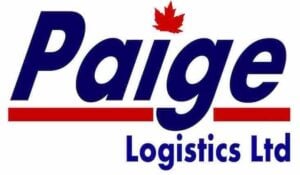Freight Brokerage
Awarded #1 in Shipping
click on badge
Mastering Cost, Insurance For Freight, with a Top Rated Freight Broker for Lean International Shipping
Navigating the complex world of freight transportation can be a daunting task for any business that relies on timely and efficient delivery of goods.
From asset-based carriers with their own fleets to versatile freight brokerages, the choices are plentiful and sometimes overwhelming.
Understanding what a freight brokerage is and how it can streamline your shipping processes is essential for making informed decisions that align with your company’s logistics needs.
What is a Freight Brokering?
At its core, acts as a crucial intermediary between shippers needing to transport goods and the carriers who have the means to move those goods.
Canada’s top rated freight broker such as Paige Logistics leverage a vast network of regional, national, and international trucking companies and ocean carriers, ensuring they can always find the right truck, trailer or container for any shipment need.
International Shipping Services
The Role of a Freight Broker
A freight broker acts as an intermediary between shippers who need to transport goods and the carriers who have the means to move those goods.
1. Vetting and Partnering with Reliable Carriers
Before a single cargo box is loaded onto a truck, a competent freight broker conducts a thorough vetting process of potential carriers. They scrutinize the carrier’s licensing, insurance, area of expertise, and track record to ensure reliability and compliance. This proactive approach is fundamental in building a resilient supply chain that you can depend on.
2. Seamless Management of Logistics
Once a freight broker is confident in their carrier network, the real work begins.
They meticulously plan and manage the journey of your shipment from start to finish.
This includes scheduling pickups, providing updates during transit, and coordinating delivery arrangements—all while optimizing costs and enhancing supply chain efficiency.
What Does a Freight Broker Do?
Network Management: Freight brokers maintain a large network of reliable transportation providers, including truckers, shipping companies, and air freight operators. This network allows them to quickly find available transportation solutions that fit the specific needs of their clients.
Matching Shippers with Carriers: The core function of a freight broker is to match shippers with carriers. They take into account the specifics of the shipment such as size, type, required delivery schedule, and special handling needs, and then find a carrier that can meet these requirements at a competitive price.
Negotiation: Freight brokers negotiate rates with carriers on behalf of shippers. Because they often handle large volumes of shipments, they are able to negotiate favorable rates that an individual shipper might not be able to secure on their own.
Coordination and Logistics Management: Once a carrier is selected, the freight broker coordinates all aspects of the shipment from start to finish. This includes arranging for pickup, managing shipping documentation, tracking the shipment, and ensuring that it is delivered on time and in good condition.
Problem Solving: Freight brokers are also responsible for handling any issues that may arise during transport, such as delays, lost shipments, or damage claims. They work to resolve these issues in a way that minimizes inconvenience and cost to the shipper.
Consultation: Often, freight brokers also provide advice and consultation services to shippers on how to best manage their logistics and supply chain, helping them to optimize their shipping operations and reduce costs.
Experiencing Excellence with a Top-Notch Brokerage
Working with a stellar freight brokerage means entering a partnership grounded in trust and transparency. A good broker doesn’t just move boxes; they move mountains to meet your deadlines, answer your queries, and tailor their services to mesh seamlessly with your business operations. Over time, they become deeply familiar with your needs, making them an invaluable extension of your logistics team.
Is Freight Brokerage the Right Fit for Your Business?
Freight shipping brokerages excel at making logistics smoother and more efficient for companies of all sizes.
They are particularly valuable if you seek expertise and extended capacity without the direct responsibility of managing fleet operations.
However, if direct control over transportation is crucial for your business model, exploring other options like asset-based logistics solutions might be better.
Choosing the Right Freight Brokerage: Five Key Considerations
Broker Size: Larger brokerages offer vast networks and robust capabilities, ideal for handling complex logistic challenges. Smaller brokers often provide more personalized service but might lack the bandwidth to handle large-scale disruptions.
Communication: Effective communication is the backbone of any fruitful partnership. Ensure your brokerage understands your needs and can articulate their processes clearly.
Capacity Access: With the majority of U.S. trucking companies operating fleets of less than 20 trucks, a brokerage’s ability to meet your needs depends heavily on their network size and quality.
Reliability: A reliable brokerage sticks to their word, especially when it comes to pricing and delivery timelines. Opt for a broker that honors their commitments, even in the face of unforeseen challenges.
Responsiveness: Life is unpredictable, and so is the logistics industry. Choose a brokerage that is prepared to handle unexpected issues promptly and effectively.
Taking the Next Step
Armed with knowledge about what freight brokerages do and how to select the best one, you’re now equipped to refine your shipping strategies and partnerships. Remember, the right brokerage is out there for every business—it’s just a matter of aligning their capabilities with your needs.
For more insights into optimizing your transportation solutions or to ask more specific questions, feel free to reach out to experts like those at Paige Logistics. Your ideal shipping solution is just a conversation away.
To determine the best freight brokerage companies is by researching their reviews as a top freight shipping company.
A freight broker acts as an intermediary between companies that need to ship goods and transportation services that can deliver those goods.
Freight brokers coordinate and facilitate the shipping process by connecting shippers with carriers that match their shipping requirements, handling negotiations, paperwork, and logistics management.
Using a freight broker can save time and money, provide access to a vast network of carriers, ensure flexibility and scalability in shipping operations, and help manage and mitigate shipping risks.
Freight brokers can handle various types of shipments, including less-than-truckload (LTL), full truckload (FTL), intermodal, international, specialized, and oversized loads.
Yes, most freight brokers offer tracking services that allow clients to monitor their shipments in real-time, providing updates on location, delivery status, and any potential delays.
Yes, freight brokers in the United States must be licensed by the Federal Motor Carrier Safety Administration (FMCSA) and are required to carry insurance and a surety bond to operate legally.
Freight brokers typically charge a commission or fee based on the cost of the shipping transaction they arrange. This fee is often a percentage of the total shipping cost.
Many freight brokers specialize in international logistics and can manage shipments that cross national borders, dealing with customs, import/export regulations, and other complexities of international freight.
When selecting a freight broker, consider their licensing, experience, range of services, network of carriers, technological capabilities (such as tracking), customer service, and their reputation within the industry.
While both act as intermediaries in the shipping process, a freight broker arranges the shipment using third-party carriers, whereas a freight forwarder typically takes possession of the goods, consolidates smaller shipments into larger ones, and may operate their own fleet of vehicles.

Author, Founder & Chief Executive Officer of Paige Logistics Ltd. → Experienced operations leader with a demonstrated history of working in the Freight Shipping, Trucking and the Railroad Industry.
Stuck for finding the best freight forwarder China to Canada? Shipping with Paige Logistics! Offering extended cross border shipping Canada to California.
Federal Motor Carrier Safety Administration
2023 Global Leader In Shipping
Freight Carriers Association of a Canada
Related Posts

Freight & Shipping Insurance The Comprehensive Guide to Shipping Insurance for Freight in International Trade Click For Best Price Awarded #1 in Shipping click on

Understanding Specialized Transport Click For Best Price From Giant Machines to Hazardous Materials: The Wild Side of Specialized Transportation! Awarded #1 in Shipping click on

Seasonal Load Restrictions How to Outsmart Seasonal Load Limits and Save Big! Click For Best Price Awarded #1 in Shipping click on badge + 0

Mastering the Intricacies of CFR Incoterms A Comprehensive Guide Click for Best price CLICK ON BADGE Deliveries + 0 Happy Clients 0 manufacturers 0 Awards

CIF Incoterms The Comprehensive Guide to CIF (Cost, Insurance & Freight) in International Trade Click For Best Price Awarded #1 in Shipping click on badge

The Ultimate Guide to Freight Shipping Documentation Fast Worldwide Freight Quote Awarded #1 in Shipping click on badge + 0 Deliveries 0 Happy Clients 0

